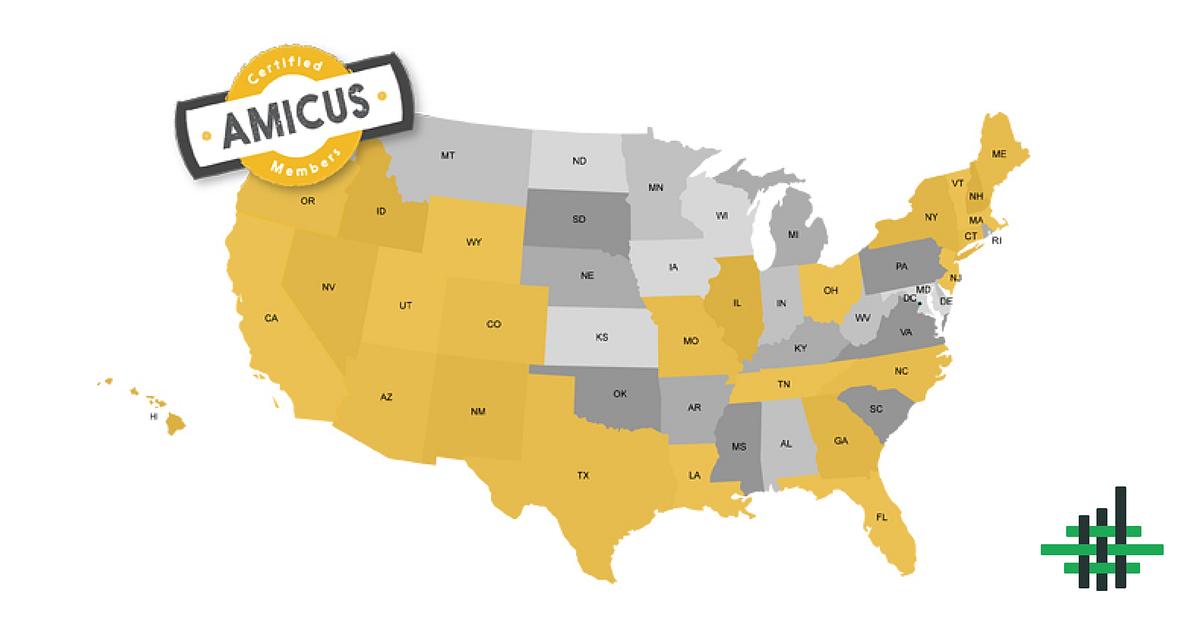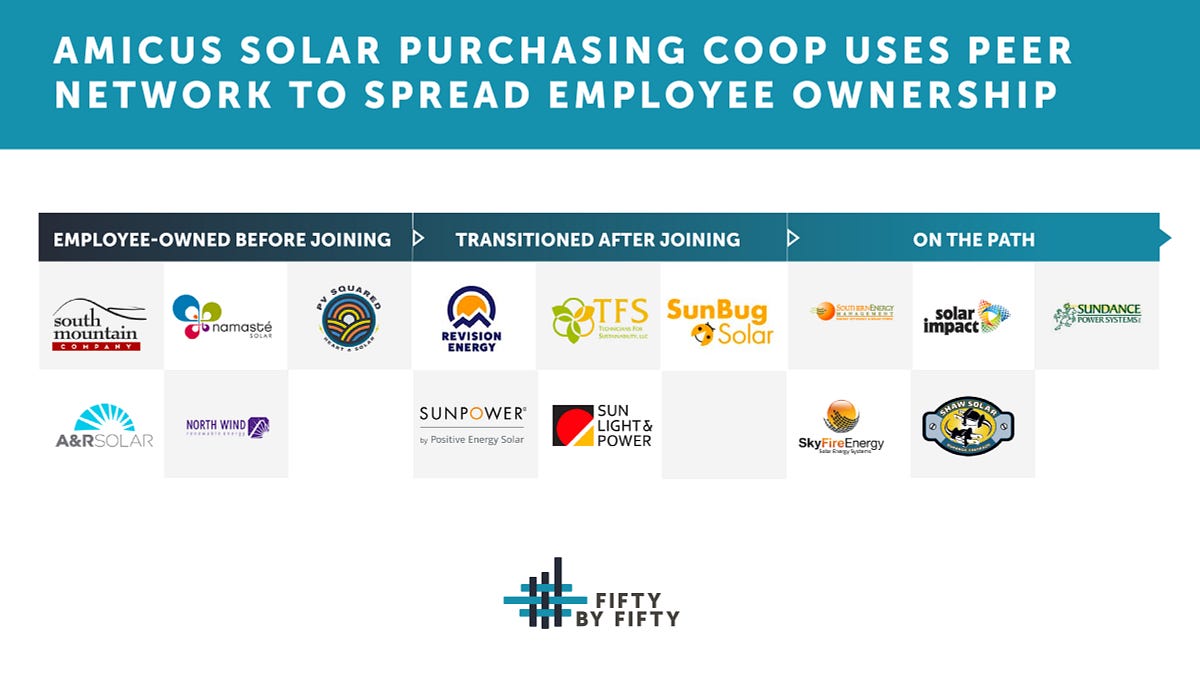Achieving Scale while Maintaining Local Impact

by Sarah Stranahan
Amicus Solar is one of more than 250 purchasing cooperatives in the US, including such well-known brands as Ace Hardware and Best Western Motels. By forming a large national cooperative, small producers or retailers increase their purchasing power and access to project financing, while remaining independently owned and operated. An additional benefit, it turns out, is that a purchasing co-op can be a particularly effective means of spreading employee ownership. In the case of Amicus Solar, we can see the synergy between sustainability and employee ownership, which Fifty by Fifty is exploring with funding from Partners for a New Economy. Environmentally oriented company founders — like those at solar companies — are proving themselves a community naturally predisposed to employee ownership.
Amicus Solar was founded in 2011 by six independent solar companies, including employee-owned cooperative and certified B Corp Namaste Solarand another B Corp, Technicians for Sustainability. Amicus Solar is led by cooperative veteran and former Namaste Solar employee-owner, Stephen Irvin, who serves as its president. Today Amicus includes 48 local and regional solar photovoltaic (PV) installers and developers who openly share and collaborate on a wide range of business issues, from operational efficiencies to sales and marketing strategies.
Similar to Best Western and Ace, Amicus is democratically owned by its members, 40 percent of which are B Corps and a growing number of which are employee owned. With five Amicus members having joined the cooperative as employee-owned companies (A&R Solar, Namaste, North Wind, PV Squared, and South Mountain), Amicus has made a conscious effort to educate its members about worker ownership. As a result, five member businesses (ReVision Energy, Technicians for Sustainability, SunBug Solar, Positive Energy, and Sunlight Solar) have converted — and another five are considering converting — to either become worker co-ops or employee stock ownership plans (ESOPs). The purchasing co-op has become a means of “industry contagion” — a way of rapidly spreading employee ownership.
Staying Local While Creating a Competitive Advantage
Since the Great Recession, there has been an increased interest in localism (also called subsidiarity) — the principle that decisions should be made at the lowest practical level or closest to where they will have their effect — because small, local mission-driven businesses have three key advantages for nurturing a more democratic and sustainable economy:
- They invest locally, capturing and multiplying value, particularly when they sell locally produced goods;
- They are more successful at participatory management because it is easier to cultivate personal trust and accountability in small-scale, local organizations; and
- They are more likely to care about and be accountable to their communities in terms of environmental health, social equity, cultural vitality, and good governance.
Localism, however, faces challenges when it comes to economies of scale, which can increase efficiency and reduce the costs of production. Scale is also required to meet the needs of densely populated urban centers, where a larger and larger portion of the world’s population lives.
Small solar installers have faced intense competition from large national companies such as SolarCity (recently acquired by Tesla), SunRun, and SunPower. By coming together in a purchasing co-op, the relatively small businesses that own Amicus Solar have leveled the playing field with their larger competitors, particularly in terms of purchasing power, while maintaining the advantages of staying local.
New Ventures
In addition to taking advantage of cost and marketing efficiencies, Amicus members share best practices and develop joint strategies to advance their common goals. For example, in 2016 Amicus won a $358,000 grant from the U.S. Department of Energy to found a new cooperative to provide high-quality operations and maintenance (O&M) support to large-scale solar installations. Today Amicus O&M Cooperative includes 20 member organizations that have set collective operations and management standards to ensure that commercial and utility-scale solar PV systems fulfill their performance expectations over the long term. Amicus O&M Cooperative is being led by another cooperative veteran and former Namaste Solar employee-owner, Amanda Bybee.
In 2017, Amicus members helped found the Clean Energy Credit Union(CECU), which received the first federal charter for a new credit union in Colorado in 31 years. CECU’s mission is to promote clean energy, environmental stewardship and cooperative enterprises through the financial services it offers its members. Using the federally insured deposits of its members, the credit union provides consumer loans to reduce the cost of clean-energy products and services.
“We envision a world where everyone can participate in the clean-energy movement,” said board chairman Blake Jones, co-founder of Boulder-based Namaste Solar. This new federally chartered credit union will make it easier for people to both invest in and use clean energy in order to help protect our environment and improve our economy.”
Jones is leading another venture in this growing ecosystem called Kachuwa Impact Fund, which has provided capital in support of multiple Amicus members. Kachuwa’s mission is two-fold:
(1) To provide privately held “impact companies” with mission-aligned, long-term, and non-controlling capital; and
(2) To provide “impact investors” with diversified, impact investment opportunities outside of Wall Street.
Kachuwa’s multiple “impact themes” include cooperatives, certified B Corps, and companies that are owned by employees, women, or people of color. Kachuwa itself is aiming to convert to an investment cooperative structure in 2019 and, among other things, to increase its support for companies converting to employee ownership both within the Amicus ecosystem and beyond. Improving access to values-aligned capital is a critically important part to growing the cooperative and employee ownership movements.

Democratic Governance
According to Irvin, president of Amicus, Namaste Solar has had powerful influence on the culture of the purchasing coop and its members. It was at Namaste Solar that Irvin learned about cooperatives, democratic processes and governance, and the importance of facilitating a process to reach consensus. Like Namaste Solar, he says, Amicus uses an open-book management policy to keep everyone fully informed and a committee structure to facilitate decision making.
Irvin told Solar Pro magazine in 2014, “[Open-book management] is important since the members are equal owners. Consensus building can take time — but once we’ve come to a decision, you see more engagement and commitment from everyone.”
Democratic governance has not only contributed to the purchasing co-op’s success, but has shown members that ownership, mission, governance, and culture matter. Today Amicus Solar is an important driver of employee ownership across an entire industry.
Sarah Stranahan is senior editorial associate at The Democracy Collaborative and a leading member of its Fifty by Fifty employee ownership team.
Fifty by Fifty is working to transform the U.S. economy by growing employee ownership. Join our campaign, and we’ll send our monthly newsletter, filled with great company stories, right to your inbox.
